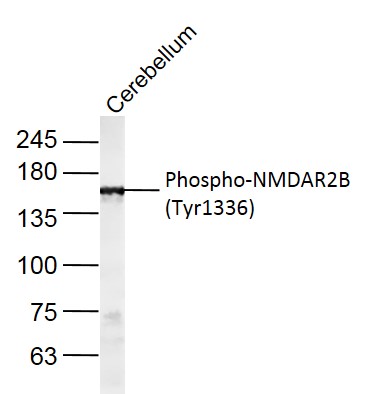
Rabbit Anti-Phospho-NMDAR2B (Tyr1336)antibody
NMDAR2B (phospho Y1336); p-NMDAR2B (phospho Y1336); NMDAR2B (Phospho-Tyr1336); NMDAR2B (Phospho-Y1336); p-NMDAR2B (Tyr1336); p-NMDAR2B (Y1336); AW490526; Glutamate [NMDA] receptor subunit epsilon 2; Glutamate [NMDA] receptor subunit epsilon-2; Glutamate R
View History [Clear]
Details
Product Name Phospho-NMDAR2B (Tyr1336) Chinese Name 磷酸化谷氨酸受体2B抗体 Alias NMDAR2B (phospho Y1336); p-NMDAR2B (phospho Y1336); NMDAR2B (Phospho-Tyr1336); NMDAR2B (Phospho-Y1336); p-NMDAR2B (Tyr1336); p-NMDAR2B (Y1336); AW490526; Glutamate [NMDA] receptor subunit epsilon 2; Glutamate [NMDA] receptor subunit epsilon-2; Glutamate Receptor Ionotropic N Methyl D Aspartate 2B; Glutamate Receptor Ionotropic N Methyl D Aspartate subunit 2B; Glutamate receptor ionotropic NMDA2B; Glutamate receptor subunit epsilon 2; Glutamate receptor, ionotropic, NMDA2B (epsilon 2); GRIN 2B; GRIN2B; hNR 3; hNR3; MGC142178; MGC142180; N methyl D asparate receptor channel subunit epsilon 2; N METHYL D ASPARTATE RECEPTOR CHANNEL SUBUNIT EPSILON 2; N methyl D aspartate receptor subtype 2B; N methyl D aspartate receptor subunit 2B; N methyl D aspartate receptor subunit 3; N-methyl D-aspartate receptor subtype 2B; N-methyl-D-aspartate receptor subunit 3; NMDA NR2B; NMDA R2B; Nmdar2b; NMDE2; NMDE2_HUMAN; NME2; NR2B; NR3. Product Type Phosphorylated anti Research Area Cell biology immunology Neurobiology Signal transduction The cell membrane受体 Immunogen Species Rabbit Clonality Polyclonal React Species Human, Rat, (predicted: Mouse, Chicken, Dog, Pig, Cow, Horse, Rabbit, ) Applications WB=1:500-2000 ELISA=1:5000-10000
not yet tested in other applications.
optimal dilutions/concentrations should be determined by the end user.Theoretical molecular weight 164kDa Cellular localization The cell membrane Form Liquid Concentration 1mg/ml immunogen KLH conjugated synthesised phosphopeptide derived from human NMDAR2B around the phosphorylation site of Tyr1336: SP(p-Y)AH Lsotype IgG Purification affinity purified by Protein A Buffer Solution 0.01M TBS(pH7.4) with 1% BSA, 0.03% Proclin300 and 50% Glycerol. Storage Shipped at 4℃. Store at -20 °C for one year. Avoid repeated freeze/thaw cycles. Attention This product as supplied is intended for research use only, not for use in human, therapeutic or diagnostic applications. PubMed PubMed Product Detail N-methyl-D-aspartate (NMDA) receptors are a class of ionotropic glutamate receptors. NMDA receptor channel has been shown to be involved in long-term potentiation, an activity-dependent increase in the efficiency of synaptic transmission thought to underlie certain kinds of memory and learning. NMDA receptor channels are heteromers composed of three different subunits: NR1 (GRIN1), NR2 (GRIN2A, GRIN2B, GRIN2C, or GRIN2D) and NR3 (GRIN3A or GRIN3B). The NR2 subunit acts as the agonist binding site for glutamate. This receptor is the predominant excitatory neurotransmitter receptor in the mammalian brain. [provided by RefSeq, Jul 2008].
Function:
NMDA receptor subtype of glutamate-gated ion channels with high calcium permeability and voltage-dependent sensitivity to magnesium. Mediated by glycine. In concert with DAPK1 at extrasynaptic sites, acts as a central mediator for stroke damage. Its phosphorylation at Ser-1303 by DAPK1 enhances synaptic NMDA receptor channel activity inducing injurious Ca2+ influx through them, resulting in an irreversible neuronal death (By similarity).
Subunit:
Forms heteromeric channel of a zeta subunit (GRIN1), a epsilon subunit (GRIN2A, GRIN2B, GRIN2C or GRIN2D) and a third subunit (GRIN3A or GRIN3B). Found in a complex with GRIN1 and GRIN3B. Found in a complex with GRIN1, GRIN3A and PPP2CB. Interacts with PDZ domains of INADL and DLG4. Interacts with HIP1 and NETO1 (By similarity). Interacts with MAGI3. Interacts with DAPK1 (By similarity).
Subcellular Location:
Cell membrane; Multi-pass membrane protein. Cell junction, synapse, postsynaptic cell membrane; Multi-pass membrane protein.
Tissue Specificity:
Primarily found in the fronto-parieto-temporal cortex and hippocampus pyramidal cells, lower expression in the basal ganglia.
Post-translational modifications:
Phosphorylation at Ser-1303 by DAPK1 enhances synaptic NMDA receptor channel activity (By similarity).
DISEASE:
Defects in GRIN2B are the cause of mental retardation autosomal dominant type 6 (MRD6) [MIM:613970]. Mental retardation is characterized by significantly below average general intellectual functioning associated with impairments in adaptative behavior and manifested during the developmental period. Note=Chromosomal aberrations involving GRIN2B have been found in patients with mental retardation. Translocations t(9;12)(p23;p13.1) and t(10;12)(q21.1;p13.1) with a common breakpoint in 12p13.1.
Similarity:
Belongs to the glutamate-gated ion channel (TC 1.A.10.1) family. NR2B/GRIN2B subfamily.
SWISS:
Q13224
Gene ID:
2904
Database links:Entrez Gene: 2904 Human
Entrez Gene: 14812 Mouse
Omim: 138252 Human
SwissProt: Q13224 Human
SwissProt: Q01097 Mouse
Unigene: 654430 Human
Unigene: 436649 Mouse
Unigene: 9711 Rat
谷氨酸受体(NR2B)是脊椎动物中枢神经系统兴奋型神经传递的主要介质。在突触可塑性极大脑学习及记忆功能方面起关键作用。Product Picture
Bought notes(bought amounts latest0)
No one bought this product
User Comment(Total0User Comment Num)
- No comment



 +86 571 56623320
+86 571 56623320
 +86 18668110335
+86 18668110335

